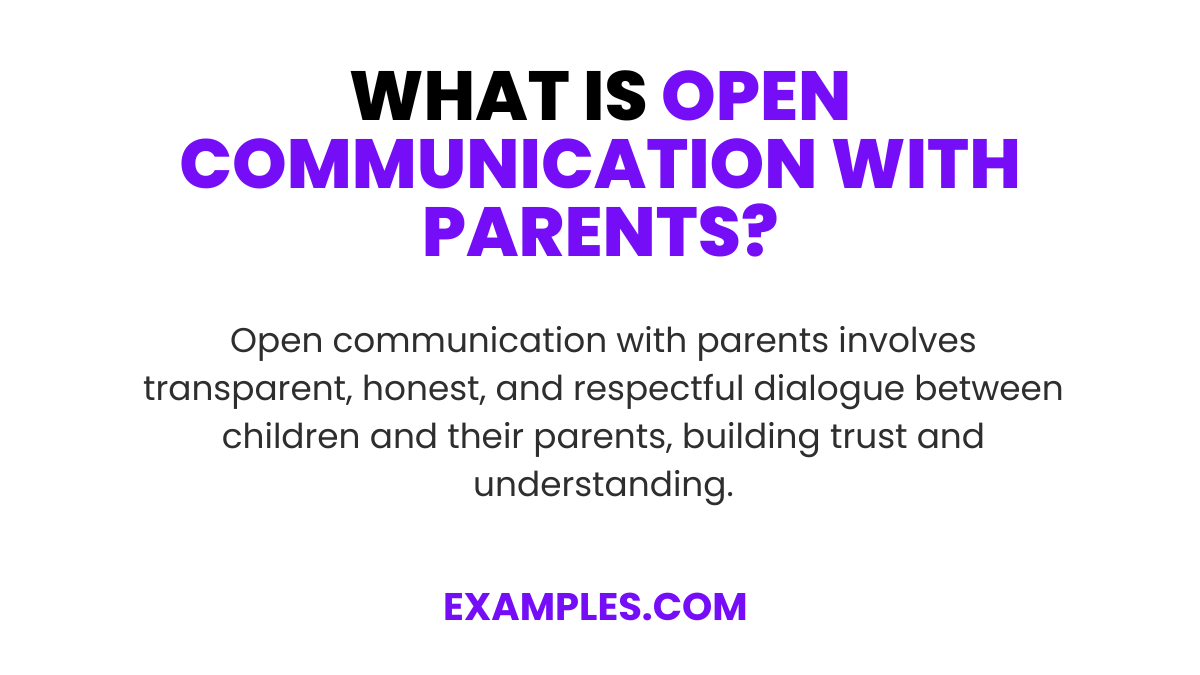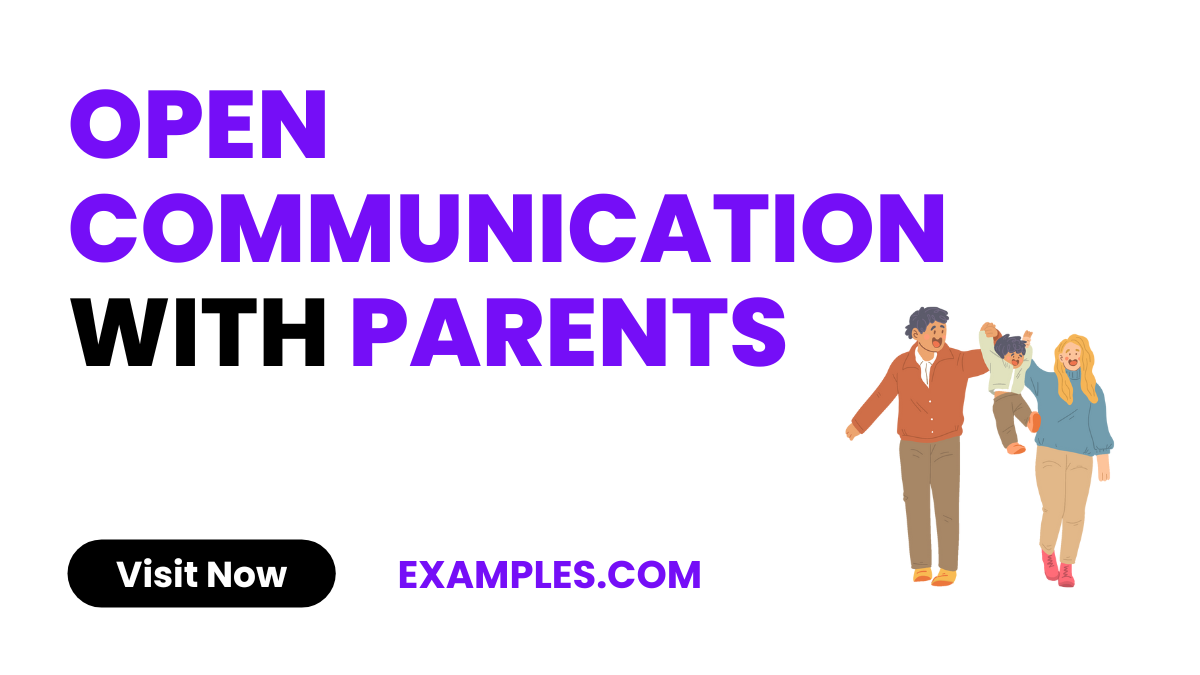10+ Open Communication with Parents Examples
Unlock the secrets to a harmonious family life with our comprehensive guide on Open Communication with Parents. Delve into practical Communication Examples that illuminate the path to stronger family bonds and mutual understanding. Learn how to navigate conversations effectively, ensuring a nurturing environment where every family member feels valued and heard. This guide is an indispensable resource for cultivating a transparent and supportive household.
Download Importance of Open Communication with Parents
What is Open Communication with Parents? – Meaning

Open Communication with parents means having a transparent, honest, and consistent dialogue between children and their parents. It involves expressing thoughts, feelings, and concerns freely and respectfully. This type of communication is essential as it builds trust, understanding, and a strong, supportive relationship that positively impacts the family’s overall dynamics.
Open Communication with Parents at Home
Open Communication with Parents at Home is pivotal for nurturing a supportive and understanding family environment. This guide dives into strategies of Open Communication in Relationship that highlight the Importance of Open Communication in Relationships, particularly between parents and children. Embrace the Open Communication Benefits as we explore various scenarios at home where clear, honest, and supportive dialogue can flourish, enhancing the bond and well-being of every family member.
- Family Vision Board Creation:
Explanation: Sometimes, family goals and aspira”Let’s create a vision board together to visualize and discuss our family goals and dreams.” - Regular Emotional Check-ins:
Explanation: Emotional well-being might be overlooked due to busy schedules. Solution: “How are you really feeling today? Let’s talk about what’s going on in our lives.” - Setting Household Rules Together:
Explanation: Rules imposed without discussion can lead to resentment or misunderstanding. Solution: “Let’s set some ground rules together for our home, so everyone feels respected and heard.” - Discussing Day-to-Day Decisions:
Explanation: Minor daily decisions can accumulate and cause unspoken tension. Solution: “What do you think about this choice? I value your opinion and want us to decide together.” - Planning Family Activities:
Explanation: Participation in planning can vary, leaving some family members feeling excluded. Solution: “Let’s plan our next family outing together. What would everyone like to do?”
What Challenges Might Arise When Trying to Establish Open Communication with Parents?
Establishing open communication with parents can be complex due to diverse backgrounds, expectations, and experiences. Understanding these challenges is key to fostering effective dialogue.
1. Differing Communication Styles: Parents and educators might have different communication styles, leading to misunderstandings. Recognizing and adapting to these styles is crucial for Honest Communication.
2. Cultural and Language Barriers: Cultural differences and language barriers can hinder effective communication. Schools should embrace strategies that reflect the diversity of families to promote Open Communication in Family and school settings.
3. Lack of Trust or Previous Negative Experiences: Some parents may have had negative experiences with educational institutions, leading to distrust. Building trust is central to overcoming these barriers and is a key part of Open Communication in Leadership.
4. Time Constraints: Both parents and educators often face time constraints, making regular communication challenging. Finding flexible and varied ways to communicate can help mitigate this issue, underlining the Importance of Open Communication.
5. Misinformation and Misunderstandings: Misinformation or misunderstandings can escalate if not addressed promptly and clearly. Ensuring clarity and accuracy in communication helps in maintaining Open Mind Communication.
What Impact Does Open Communication with Parents Have on a Child’s Overall Well-being?
Open communication between parents and educators significantly impacts a child’s emotional, social, and academic development, creating a supportive environment for growth.
1. Enhanced Emotional Well-being: When parents and educators communicate openly, children feel more secure and understood, boosting their self-esteem and emotional health, highlighting the importance of open communication.
2. Improved Academic Performance: Children perform better academically when there is a strong partnership between home and school. Open communication in family and school settings provides consistent support and encouragement.
3. Stronger Social Skills: Open communication models positive interaction and conflict resolution skills for children, aiding in their social development and relationships, reflecting why is open communication important in workplace and community.
4. Better Problem-Solving Skills: Children learn to express themselves and solve problems more effectively when they see adults engaging in communication and collaborative problem-solving.
5. Increased Parental Involvement: Open communication encourages parental involvement in a child’s education and daily life, fostering a richer, more supportive environment for the child, aligning with How to Create Culture of Open Communication at Workplace and home.
Tips for Open Communication with Parents
- Active Listening: Encourage active listening, mirroring Communication Skills needed in effective workplace dialogue, similar to Open Communication in the Workplace.
- Empathetic Responses: Show empathy in responses, akin to the sensitivity required in Open Communication in Healthcare.
- Use Inspirational Quotes: Incorporate Open Communication Quotes to inspire and guide conversations, setting a positive tone.
- Clarity in Expression: Ensure clarity in your expression, reflecting a clear Communication Style that avoids misunderstandings.
- Feedback Encouragement: Create an environment where feedback is welcomed, essential for fostering open and communication.
Why is Open Communication with Parents Important?
Open communication with parents ensures a supportive, transparent environment, enhancing child development and family relationships, emphasizing the need for Open Communication with Child.
What are 2 Ways you can Promote Open Communication with Parents?
- Regular Update Meetings: Schedule consistent meetings for updates and discussions, fostering Open Communication with Patients and parents alike.
- Feedback Channels: Create diverse channels for feedback and conversation, encouraging Open Communication with Students and their families.
How can Schools Promote Open Communication with Parents?
Schools can promote open communication by organizing parent-teacher meetings and workshops, and by creating inclusive policies that encourage Open Communication with Colleagues and Open Communication with Manager strategies.
Open communication with parents is vital in fostering healthy relationships and addressing family challenges. By embracing strategies that contrast Open Communication vs Closed Communication and understanding the dynamics of Open Communication vs Direct Communication, families can navigate complexities effectively. This guide underscores the importance of dialogue, akin to Open Communication with Stakeholders, ensuring a supportive and transparent family environment.
10+ Open Communication with Parents Examples

Unlock the secrets to a harmonious family life with our comprehensive guide on Open Communication with Parents. Delve into practical Communication Examples that illuminate the path to stronger family bonds and mutual understanding. Learn how to navigate conversations effectively, ensuring a nurturing environment where every family member feels valued and heard. This guide is an indispensable resource for cultivating a transparent and supportive household.
Download Importance of Open Communication with Parents
What is Open Communication with Parents? – Meaning

Open Communication with parents means having a transparent, honest, and consistent dialogue between children and their parents. It involves expressing thoughts, feelings, and concerns freely and respectfully. This type of communication is essential as it builds trust, understanding, and a strong, supportive relationship that positively impacts the family’s overall dynamics.
Open Communication with Parents at Home
Open Communication with Parents at Home is pivotal for nurturing a supportive and understanding family environment. This guide dives into strategies of Open Communication in Relationship that highlight the Importance of Open Communication in Relationships, particularly between parents and children. Embrace the Open Communication Benefits as we explore various scenarios at home where clear, honest, and supportive dialogue can flourish, enhancing the bond and well-being of every family member.
Family Vision Board Creation:
Explanation: Sometimes, family goals and aspira”Let’s create a vision board together to visualize and discuss our family goals and dreams.”Regular Emotional Check-ins:
Explanation: Emotional well-being might be overlooked due to busy schedules. Solution: “How are you really feeling today? Let’s talk about what’s going on in our lives.”Setting Household Rules Together:
Explanation: Rules imposed without discussion can lead to resentment or misunderstanding. Solution: “Let’s set some ground rules together for our home, so everyone feels respected and heard.”Discussing Day-to-Day Decisions:
Explanation: Minor daily decisions can accumulate and cause unspoken tension. Solution: “What do you think about this choice? I value your opinion and want us to decide together.”Planning Family Activities:
Explanation: Participation in planning can vary, leaving some family members feeling excluded. Solution: “Let’s plan our next family outing together. What would everyone like to do?”
What Challenges Might Arise When Trying to Establish Open Communication with Parents?
Establishing open communication with parents can be complex due to diverse backgrounds, expectations, and experiences. Understanding these challenges is key to fostering effective dialogue.
1. Differing Communication Styles: Parents and educators might have different communication styles, leading to misunderstandings. Recognizing and adapting to these styles is crucial for Honest Communication.
2. Cultural and Language Barriers: Cultural differences and language barriers can hinder effective communication. Schools should embrace strategies that reflect the diversity of families to promote Open Communication in Family and school settings.
3. Lack of Trust or Previous Negative Experiences: Some parents may have had negative experiences with educational institutions, leading to distrust. Building trust is central to overcoming these barriers and is a key part of Open Communication in Leadership.
4. Time Constraints: Both parents and educators often face time constraints, making regular communication challenging. Finding flexible and varied ways to communicate can help mitigate this issue, underlining the Importance of Open Communication.
5. Misinformation and Misunderstandings: Misinformation or misunderstandings can escalate if not addressed promptly and clearly. Ensuring clarity and accuracy in communication helps in maintaining Open Mind Communication.
What Impact Does Open Communication with Parents Have on a Child’s Overall Well-being?
Open communication between parents and educators significantly impacts a child’s emotional, social, and academic development, creating a supportive environment for growth.
1. Enhanced Emotional Well-being: When parents and educators communicate openly, children feel more secure and understood, boosting their self-esteem and emotional health, highlighting the importance of open communication.
2. Improved Academic Performance: Children perform better academically when there is a strong partnership between home and school. Open communication in family and school settings provides consistent support and encouragement.
3. Stronger Social Skills: Open communication models positive interaction and conflict resolution skills for children, aiding in their social development and relationships, reflecting why is open communication important in workplace and community.
4. Better Problem-Solving Skills: Children learn to express themselves and solve problems more effectively when they see adults engaging in communication and collaborative problem-solving.
5. Increased Parental Involvement: Open communication encourages parental involvement in a child’s education and daily life, fostering a richer, more supportive environment for the child, aligning with How to Create Culture of Open Communication at Workplace and home.
Tips for Open Communication with Parents
Active Listening: Encourage active listening, mirroring Communication Skills needed in effective workplace dialogue, similar to Open Communication in the Workplace.
Empathetic Responses: Show empathy in responses, akin to the sensitivity required in Open Communication in Healthcare.
Use Inspirational Quotes: Incorporate Open Communication Quotes to inspire and guide conversations, setting a positive tone.
Clarity in Expression: Ensure clarity in your expression, reflecting a clear Communication Style that avoids misunderstandings.
Feedback Encouragement: Create an environment where feedback is welcomed, essential for fostering open and communication.
Why is Open Communication with Parents Important?
Open communication with parents ensures a supportive, transparent environment, enhancing child development and family relationships, emphasizing the need for Open Communication with Child.
What are 2 Ways you can Promote Open Communication with Parents?
Regular Update Meetings: Schedule consistent meetings for updates and discussions, fostering Open Communication with Patients and parents alike.
Feedback Channels: Create diverse channels for feedback and conversation, encouraging Open Communication with Students and their families.
How can Schools Promote Open Communication with Parents?
Schools can promote open communication by organizing parent-teacher meetings and workshops, and by creating inclusive policies that encourage Open Communication with Colleagues and Open Communication with Manager strategies.
Open communication with parents is vital in fostering healthy relationships and addressing family challenges. By embracing strategies that contrast Open Communication vs Closed Communication and understanding the dynamics of Open Communication vs Direct Communication, families can navigate complexities effectively. This guide underscores the importance of dialogue, akin to Open Communication with Stakeholders, ensuring a supportive and transparent family environment.


